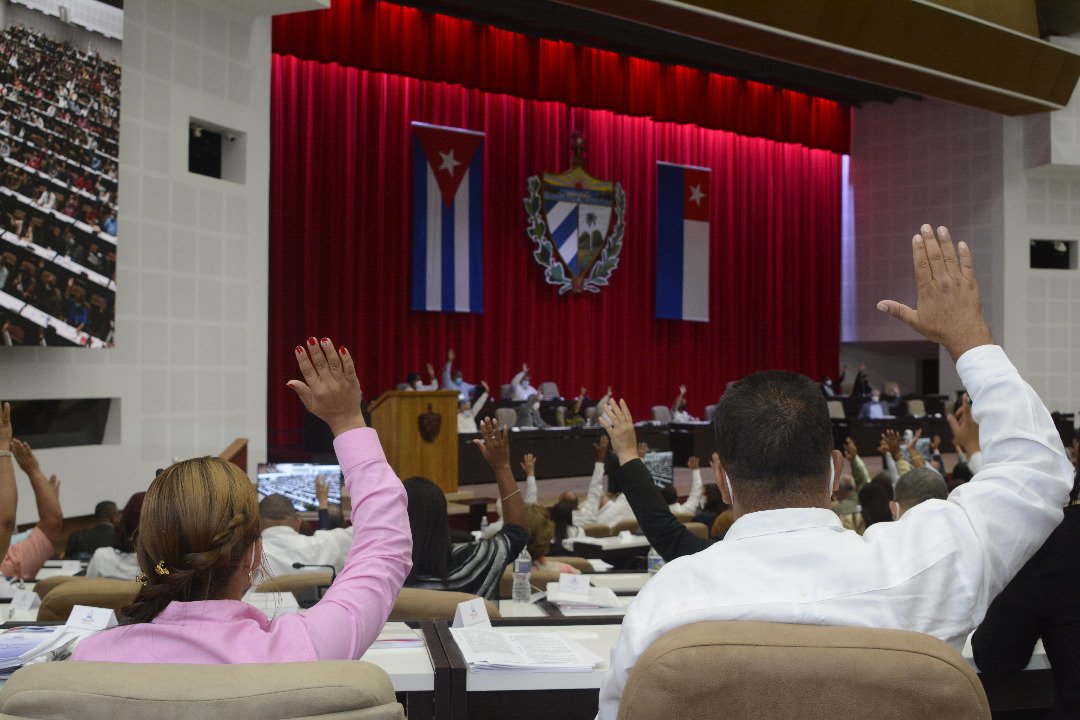With the Tenth Ordinary Period of Sessions, the IX Legislature of the National Assembly of Popular Power (ANPP). Its agenda will be marked by the debate and the approval of important laws, accountability and important information that will be provided to the deputies by some agencies and ministries.
According to the criteria expressed in the television program Mesa Redonda by the secretary of the Council of State and the ANPP, Homero Acosta Álvarez, it will be the closing of a legislature that “has had a broad legislative agenda, with parliamentary and constituent activity of great depth”.
new bills to @Cuba Assembly
.
The draft regulations will be presented at the Tenth Ordinary Session of the National Assembly of People’s Power, which begins on December 12 #Cuba https://t.co/jDPdIHImNO pic.twitter.com/AW54bXpDsJ— Escambray (@escambraycu) December 6, 2022
Regarding the program that is coming, the official indicated that, as every December, “economic issues will have great weight in the debate,” says the review of the program published on the official website Cubadebate.
According to the disclosed schedule, on the 12th the deputies will analyze the progress of the economy and compliance with government decisions. The owner of the Ministry of Economy and Planning (MEP)Alejandro Gil Fernández, will present the Economy Plan for the year 2023.
The approval of the Budget Law for next year, as well as information provided by the Minister of Energy and Mines with details on the situation of the National Electric Power System (SEN)They are also part of the program.
According to Cubadebate, the delegates will also learn about the implementation of the Food Sovereignty, Food and Nutrition Security Law, and will review the progress of the improvement of retail trade at the local level based on a report that will be presented by the minister of the branch, Betsy Diaz Velazquez.
In the following days, the members of the ANNP will ratify decisions made by the Council of State, a structure that for the first time will report to Parliament.
Acosta Álvarez explained that 30 laws have been approved in the current legislature, while the Council of State has validated 65 Decree-Laws. “The Council of State has functioned regularly, even in the midst of the pandemic,” he said, quoted by Cubadebate.
In the following days, important regulations for the functioning of the country will be presented, such as the Social Communication Law project, the Expropriation Law for reasons of public utility, and the Law project of the Attorney General of the Republic.
One of the transcendental moments of this new session will be the approval of the Livestock Promotion and Development Law project, a regulation that will update the one that has been in force since 1974, and with which it is intended to promote the development of one of the most stagnant agricultural activities in the country.
Due to its impact on the domestic economy, marked by a deep crisis and by the scarcity of products and food, the new legal provision arouses expectations, although many agree that the availability of meat and milk in the Cuban table, nor will it control the high numbers of theft and slaughter of cattle currently existing.
During her speech on the program, Meisi Bolaños Weiss, Minister of Finance and Prices (MFP), alluded to the Bill of Expropriation for Reasons of Public Utility or Social Interest, which she considered “eminently guaranteeing”, since it will regulate the bases on which expropriation may be decreed, an instrument present in the laws of most countries.
The official affirmed that in the proposed law “there is no place for arbitrary decisions” and the authorities that can declare the public interest are defined. In turn, she reaffirmed that “this instrument will continue to be used in a very exceptional way, as a last alternative, due to the importance of offering legal certainty in the use and enjoyment of the property to its owners or holders.”
Regarding the Social Communication Law, Onelio Castillo Corderí, vice president of the Cuban Institute of Radio and Television, explained several of its details and stressed that it has been the result of “a collective construction”, with various spaces for analysis and contributions from the organizations professionals, experts, academics and professionals from different fields of knowledge.
He recalled that initially it was thought of as a Decree Law and then “due to a wise and pertinent decision of the country” it took on the legal rank of Law. According to Castillo Cordoví’s considerations, the project assumes the communication processes with a strategic and integrated vision, not only in its media expression, which has been the main tendency in all the laws of this matter in the world.
The vice president of the ICRT commented that the bill distinguishes people as the main subjects of communication processes in physical and digital public spaces. At the same time, “it complies with constitutional mandates, among them, the right of people to access and use the information generated in the State bodies and its entities, the right to freedom of the press of the fundamental media of social communication, and the obligation of public services and State officials to offer information and render an account to the people”.
The regulation comes to resolve issues that today have a deficit in Cuban legislation, and will provide the public media system with a legal framework that enables it to achieve greater autonomy and legitimacy, according to the opinion of the director exposed at the Round Table.
As a novelty, advertising and sponsorship are recognized as part of the country’s communication processes, activities that exist today and demand regulation. “You can have advertising and sponsorship in socialism, responsible consumption can be oriented in a sustainable way”, he stressed.






